The Catalyst Killing - [44]
Her reaction was so unexpected that I almost jumped. Miriam Filtvedt Bentsen pointed at me across the table in a manner that was almost accusing.
‘Yes, in fact, I read it in a parish yearbook from Valdres when I was twelve. It’s an incredible story. But where did you hear it? And does it have any bearing on Falko’s disappearance?’
I told her honestly that I had no idea yet. But I had heard the story now and thought that the similarity was remarkable, especially given that it had apparently happened in 1868.
Miriam Filtvedt Bentsen nodded eagerly and pointed at me again, then leaned forward across the table.
‘The year is one thing, certainly, but if I remember correctly, it was in fact on the night of 5 August 1868 that Karl vanished into thin air on his way down the mountain in Valdres. I may be wrong – after all, it is ten years since I read the article. But I am pretty sure it was, and could easily find the book and check again as soon as the libraries open on Monday. And if I’m right about the date, then it really is a remarkable coincidence, isn’t it? How exciting!’
I felt my pulse rising, but was not quite sure whether this was due to the incredible coincidence of dates or the sudden outburst of the otherwise so calm Miriam. So I asked her to check the date at the library on Monday, and to contact me as soon as she had. I told her I agreed that if she had indeed remembered the date correctly, it was a very interesting and exciting find. She nodded eagerly again, an unexpected glow in her eyes.
So the mood in the car was very jolly once again for the last two hours as we headed into Oslo. I ventured to ask a bit more about the others who had been at the cabin. She took the hint and spoke only of them for the rest of the trip. However, there was not much new to be gleaned, compared with what she had told me before.
Kristine Larsen was an only child. Both her parents were teachers at Hegdehaugen, but we quickly established that I had not been taught by either of them in my final years.
Anders Pettersen was, in Miriam Filtvedt Bentsen’s words, ‘the prototype artist and communist. Quite possibly talented, but very definitely self-absorbed and ambitious.’
In Miriam Filtvedt Bentsen’s opinion, Trond Ibsen was a far more gifted man, socially, even though he often pushed his psychological reasoning too far.
She had seen Anders Pettersen as Falko’s loyal younger brother, whereas Trond Ibsen had a far more independent role. Anders Pettersen and Trond Ibsen generally shared the same political views, but there had been some rivalry between them since Falko’s disappearance, as they vied for the role of leader. There was a degree of jealousy on Anders’ part, as he could not compete with Trond when it came to family traditions and wealth. The legendary playwright, Henrik Ibsen, was a distant relative, and a number of well-known names from cultural and philosophical circles were in Trond’s immediate family, including, for example, the famous communist and historian Johannes Heftye, who was an uncle on his mother’s side.
She threw me a questioning glance when she said this, and I said that it could well be an important link. It crossed my mind that it was rather odd that neither Trond Ibsen nor Johannes Heftye had said anything about this to me. And that it was a blessing that Miriam Filtvedt was so open with me, and showed no apparent sign of any kind of sympathy for either of the men in the group.
When we drove past Grefsen, I said that I would quite possibly have to contact her again in the course of the investigation. It was fine by me if she wanted to tell her parents that she had been questioned by the police, but I asked her not to mention this trip or any of the details we had spoken about to anyone, not even those closest to her. I then waited with a pounding heart to see if she used the opportunity to mention a boyfriend – which, to my huge relief, she didn’t. She smiled, remarked that it was important keep one’s family life and private life separate, and assured me that she would keep everything that she had seen and heard today strictly to herself.
When I dropped her off outside the party office, I said that her company had been refreshing in the midst of the murder investigation. She replied that it had been ‘extremely interesting’ to follow a murder investigation for a few hours. I would have preferred it had she said ‘extremely pleasant’, but was happy enough with that for the moment. Especially when she added with a little smile that I was welcome to contact her again should I have any more questions that she might possibly help me with. Then we waved happily to each other through the car window.
My fascination with this calm and knowledgeable young lady was growing in the midst of this grisly business. As I drove back to what would no doubt be a far less engaging meeting with the powerful head of the police security service, I could unfortunately not think of any new questions to contact her about at the moment, but very much hoped that some would soon crop up.
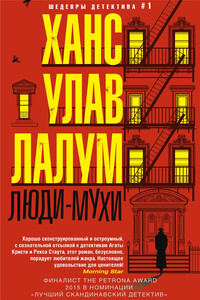
Убит бывший лидер норвежского Сопротивления и бывший член кабинета министров Харальд Олесен. Его тело обнаружено в запертой квартире, следов взлома нет, орудие убийства отсутствует. На звук выстрела к двери Олесена сбежались все соседи, но никого не увидели. Инспектор уголовного розыска Колбьёрн Кристиансен считает, что убийство, скорее всего, совершил кто-то из них. Более того, он полагает, что их показания лживы.
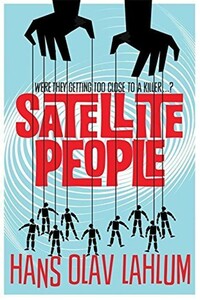
A gripping, evocative, and ingenious mystery which pays homage to Agatha Christie, Satellite People is the second Norwegian mystery in Hans Olav Lahlum's series. Oslo, 1969: When a wealthy man collapses and dies during a dinner party, Norwegian Police Inspector Kolbjorn Kristiansen, known as K2, is left shaken. For the victim, Magdalon Schelderup, a multimillionaire businessman and former resistance fighter, had contacted him only the day before, fearing for his life. It soon becomes clear that every one of Schelderup's 10 dinner guests is a suspect in the case.
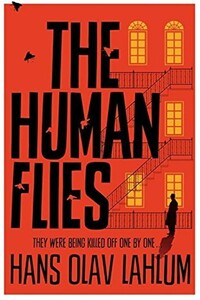
Oslo, 1968: ambitious young detective Inspector Kolbjorn Kristiansen is called to an apartment block, where a man has been found murdered. The victim, Harald Olesen, was a legendary hero of the Resistance during the Nazi occupation, and at first it is difficult to imagine who could have wanted him dead. But as Detective Inspector Kolbjorn Kristiansen (known as K2) begins to investigate, it seems clear that the murderer could only be one of Olesen's fellow tenants in the building. Soon, with the help of Patricia – a brilliant young woman confined to a wheelchair following a terrible accident – K2 will begin to untangle the web of lies surrounding Olesen's neighbors; each of whom, it seems, had their own reasons for wanting Olesen dead.
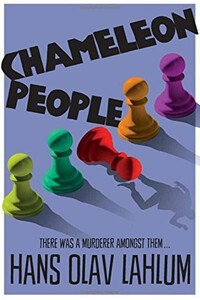
From the international bestselling author, Hans Olav Lahlum, comes Chameleon People, the fourth murder mystery in the K2 and Patricia series.1972. On a cold March morning the weekend peace is broken when a frantic young cyclist rings on Inspector Kolbjorn 'K2' Kristiansen's doorbell, desperate to speak to the detective.Compelled to help, K2 lets the boy inside, only to discover that he is being pursued by K2's colleagues in the Oslo police. A bloody knife is quickly found in the young man's pocket: a knife that matches the stab wounds of a politician murdered just a few streets away.The evidence seems clear-cut, and the arrest couldn't be easier.
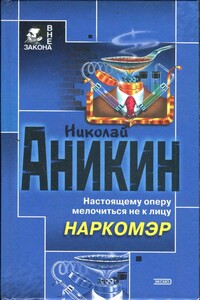
Тупик. Стена. Старый кирпич, обрывки паутины. А присмотреться — вроде следы вокруг. Может, отхожее место здесь, в глухом углу? Так нет, все чисто. Кто же сюда наведывается и зачем? И что охраняет тут охрана? Да вот эту стену и охраняет. Она, как выяснилось, с секретом: время от времени отъезжает в сторону. За ней цех. А в цеху производят под видом лекарства дурь. Полковник Кожемякин все это выведал. Но надо проникнуть внутрь и схватить за руку отравителей, наживающихся на здоровье собственного народа. А это будет потруднее…

«Посмотреть в послезавтра» – остросюжетный роман-триллер Надежды Молчадской, главная изюминка которого – атмосфера таинственности и нарастающая интрига.Девушка по имени Венера впадает в кому при загадочных обстоятельствах. Спецслужбы переправляют ее из закрытого городка Нигдельск в Москву в спецклинику, где известный ученый пытается понять, что явилось причиной ее состояния. Его исследования приводят к неожиданным результатам: он обнаруживает, что их связывает тайна из его прошлого.
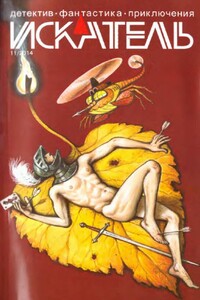
«ИСКАТЕЛЬ» — советский и российский литературный альманах. Издаётся с 1961 года. Публикует фантастические, приключенческие, детективные, военно-патриотические произведения, научно-популярные очерки и статьи. В 1961–1996 годах — литературное приложение к журналу «Вокруг света», с 1996 года — независимое издание.В 1961–1996 годах выходил шесть раз в год, в 1997–2002 годах — ежемесячно; с 2003 года выходит непериодически.Содержание:Анатолий Королев ПОЛИЦЕЙСКИЙ (повесть)Олег Быстров УКРАДИ МОЮ ЖИЗНЬ (окончание) (повесть)Владимир Лебедев ГОСТИ ИЗ НИОТКУДА.
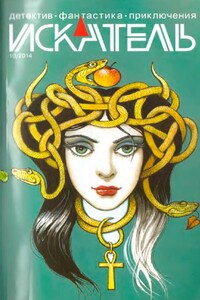
«ИСКАТЕЛЬ» — советский и российский литературный альманах. Издается с 1961 года. Публикует фантастические, приключенческие, детективные, военно-патриотические произведения, научно-популярные очерки и статьи. В 1961–1996 годах — литературное приложение к журналу «Вокруг света», с 1996 года — независимое издание.В 1961–1996 годах выходил шесть раз в год, в 1997–2002 годах — ежемесячно; с 2003 года выходит непериодически.Содержание:Олег Быстров УКРАДИ МОЮ ЖИЗНЬ (повесть);Петр Любестовский КЛЕТКА ДЛЯ НУТРИИ (повесть)
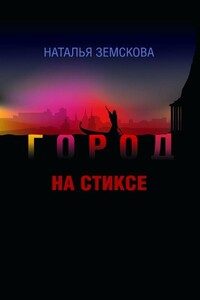
Наталья Земскова — журналист, театральный критик. В 2010 г. в издательстве «Астрель» (Санкт-Петербург) вышел её роман «Детородный возраст», который выдержал несколько переизданий. Остросюжетный роман «Город на Стиксе» — вторая книга писательницы. Молодая героиня, мечтает выйти замуж и уехать из забитого новостройками областного центра. Но вот у неё на глазах оживают тайны и легенды большого губернского города в центре России, судьбы талантливых людей, живущих рядом с нею. Роман «Город на Стиксе» — о выборе художника — провинция или столица? О том, чем рано или поздно приходится расплачиваться современному человеку, не верящему ни в Бога, ни в черта, а только в свой дар — за каждый неверный шаг.
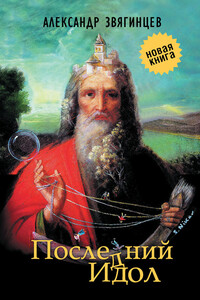
В сборник «Последний идол» вошли произведения Александра Звягинцева разных лет и разных жанров. Они объединены общей темой исторической памяти и личной ответственности человека в схватке со злом, которое порой предстает в самых неожиданных обличиях. Публикуются рассказы из циклов о делах следователей Багринцева и Северина, прокуроров Ольгина и Шип — уже известных читателям по сборнику Звягинцева «Кто-то из вас должен умереть!» (2012). Впервые увидит свет пьеса «Последний идол», а также цикл очерков писателя о событиях вокруг значительных фигур общественной и политической жизни России XIX–XX веков — от Петра Столыпина до Солженицына, от Александра Керенского до Льва Шейнина.